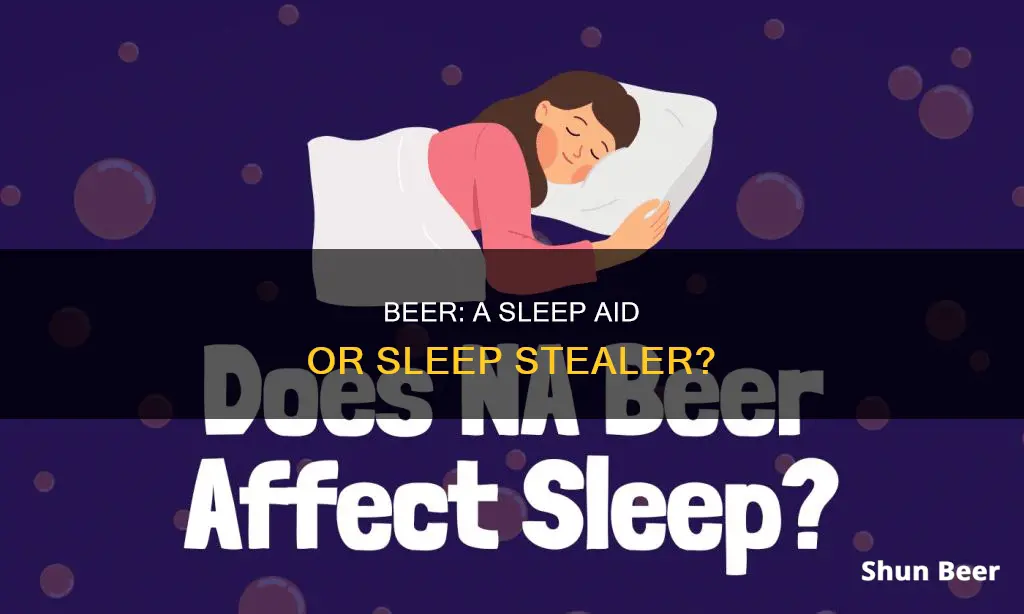
Alcohol is a central nervous system depressant, which slows down brain activity and creates a sedative effect. This can make you feel relaxed and sleepy, helping you fall asleep faster. However, alcohol can negatively impact your sleep quality. It can cause frequent awakenings, affect REM sleep, and lead to dehydration, disturbed sleep, and an increase in body temperature. Research suggests that even low alcohol consumption before bedtime can reduce sleep quality. Therefore, it is recommended to avoid alcohol close to bedtime and allow sufficient time for your body to process it.
| Characteristics | Values |
|---|---|
| Effect on sleepiness | Alcohol enhances the brain's levels of a chemical called adenosine, which can lead to sleepiness. |
| Effect on sleep quality | Alcohol reduces sleep quality, with higher consumption correlating with lower sleep quality. |
| Effect on sleep quantity | Alcohol can lead to more awakenings, resulting in less sleep. |
| Effect on sleep cycle | Alcohol can disrupt the sleep cycle by reducing REM sleep and increasing slow-wave sleep. |
| Effect on sleep disorders | Alcohol can worsen sleep disorders such as sleep apnea and insomnia. |
| Effect on body temperature | Alcohol can increase body temperature, disrupting sleep. |
| Effect on hydration | Alcohol has a diuretic effect, leading to dehydration and frequent urination. |
What You'll Learn

Alcohol is a depressant and slows brain activity, acting as a sedative
Alcohol is a central nervous system depressant, which means it slows brain activity and acts as a sedative. It has a relaxing effect, helping you to feel drowsy and fall asleep faster. However, while alcohol might make you fall asleep more quickly, it can negatively impact your sleep quality.
Alcohol increases the levels of adenosine in the brain, a chemical that induces sleepiness. It also relaxes the airway, which can worsen snoring and sleep apnea. But as your body works to metabolise the alcohol, you're likely to experience more disruptions to your sleep.
Alcohol can cause frequent, short awakenings as it wears off, interrupting REM sleep, which is important for dreaming, learning, and memory processing. REM sleep is the deepest stage of sleep and is considered the most restorative. It also plays a role in memory and concentration. Poor or insufficient REM sleep can cause grogginess the next day and has been linked to a higher risk of disease and early death.
Even low alcohol consumption can hurt sleep quality. A study by Finnish researchers found that low amounts of alcohol decreased sleep quality by over 9%, while moderate amounts reduced it by nearly 25%, and heavy drinking by almost 40%.
In addition to affecting sleep quality, alcohol can also interfere with your circadian rhythm, causing you to wake up frequently or before you're properly rested. It can also lead to more intense snoring and nightmares, resulting in a restless night.
The Beer Choice of Misato: A Deep Dive
You may want to see also

It increases the production of the sleep-inducing chemical adenosine
Alcohol is a central nervous system depressant, or sedative, that slows brain activity. This creates a sedative effect that helps you relax and makes you drowsy, so you fall asleep faster.
According to the National Sleep Foundation, one explanation for poor sleep after drinking is that the production of adenosine, a chemical in the brain that acts as a sleep-inducer, increases while drinking, allowing you to go to sleep quickly. However, this chemical quickly subsides, making you more likely to wake up throughout the night.
Adenosine is a byproduct of the active phase of the brain. When we are awake and active, our brain cells (neurons) produce adenosine. The more active our brain is, the more adenosine is produced.
Adenosine is like a timer that tells our body when it's time to sleep. When we are awake, adenosine slowly builds up in the brain, binding to its receptors and making us feel increasingly tired. When we fall asleep, the level of adenosine in our brain decreases rapidly.
Alcohol increases the production of adenosine, which is why drinking a beer can help you fall asleep faster. However, as the body metabolizes the alcohol throughout the night, the sedative effects wear off, and the levels of adenosine decrease, causing you to wake up frequently and experience fragmented sleep.
Dissolved Oxygen in Beer: What's the Science?
You may want to see also

It can cause dehydration, leading to headaches
Alcohol is a diuretic, which means that drinking beer or any other type of alcohol before bed will make you need to pee more. This can cause dehydration, which in turn can lead to headaches.
Drinking alcohol can also cause frequent awakenings, which can further contribute to dehydration. Each time you wake up, you may find yourself reaching for a glass of water, especially if you are feeling hot and sweaty. This can create a cycle of dehydration that leads to headaches and disturbed sleep.
To avoid dehydration and the resulting headaches, it is important to drink water along with alcohol and to allow at least three hours between your last drink and bedtime. This will give your body time to process the alcohol and reduce the risk of dehydration and disrupted sleep.
It is also worth noting that alcohol can affect people differently, and some people may be more prone to dehydration and headaches than others. Additionally, drinking large amounts of alcohol can have more severe consequences, including a significant reduction in sleep quality and the development of sleep disorders. Therefore, it is generally recommended to avoid using alcohol as a sleep aid and to seek alternative methods for improving sleep.
Beer and TB: What You Need to Know
You may want to see also

It increases body temperature, disrupting sleep
Alcohol is highly calorific, and drinking too much means your body has to burn off these additional calories. This increase in calorie burning raises your body temperature. To get a good night's sleep, your body temperature needs to drop by about 1°C. But the alcohol in your system prevents this from happening, leading to poorer sleep, especially in the second half of the night.
When you drink, your body is suddenly faced with burning off a large number of extra calories. This process raises your body temperature, creating a barrier to losing heat. As a result, you're more likely to wake up bathed in sweat with a soaking wet pillow.
The effect is even more pronounced when alcohol is combined with a heavy or fatty meal, such as a kebab or a curry. Your body has to work harder to keep you cool and asleep.
The impact of alcohol on body temperature is just one of the ways in which drinking disrupts sleep. Alcohol also affects your sleep cycle, reducing the amount of time you spend in REM sleep, which is the most restorative phase of sleep. This can lead to a decrease in sleep quality, leaving you feeling tired the next day.
To minimize the impact of alcohol on your sleep, it's recommended to allow at least three to four hours between your last drink and bedtime. This gives your body time to process the alcohol and reduce its negative effects on your sleep.
Antidepressants and Alcohol: Is It Safe to Mix?
You may want to see also

It can cause or worsen sleep disorders, such as sleep apnea
Drinking alcohol, including beer, may help you fall asleep faster, but it can also cause or worsen sleep disorders, such as sleep apnea. Sleep apnea is a disorder characterised by short and frequent breathing cessations during sleep. These cessations force the body to partially wake up repeatedly to restore proper breathing, preventing the person from getting deep, restful sleep.
Alcohol causes physiological changes that affect people with sleep apnea. It relaxes the tongue and throat muscles and causes changes to the blood vessels in the nose, leading to greater airway resistance in the nasal passages. These alterations significantly increase the likelihood and duration of breathing events during sleep.
Alcohol also affects people with central sleep apnea (CSA), which occurs when the brain periodically stops sending signals involved in breathing. Alcohol interferes with the brain's ability to receive chemical messages involved in breathing, decreasing the body's respiratory drive and increasing the likelihood of pauses in breathing.
People with alcohol in their systems are harder to wake up, which means they are less likely to experience the "arousals" that help restore breathing in those with sleep apnea.
In addition, heavy alcohol use can contribute to the development of insomnia, a sleep disorder characterised by difficulty falling and staying asleep. As many as three-quarters of people with alcohol dependence experience insomnia symptoms when they drink. Insomnia is also common in people in withdrawal or early recovery from alcohol addiction.
While heavy alcohol use can trigger insomnia, the opposite is also true. People with insomnia have an increased risk of developing alcohol use disorder, possibly because they turn to alcohol as a sleep aid.
Beer Trading: How Does It Work?
You may want to see also
Frequently asked questions
While drinking a beer may help you fall asleep faster, it will likely disrupt your sleep later in the night. Alcohol negatively affects sleep quality and can cause frequent waking, dehydration, and disturbed sleep due to increased body temperature.
Alcohol enhances the brain's levels of a chemical called adenosine, which can lead to sleepiness. It also relaxes the airway, worsening snoring and sleep apnea. As alcohol wears off, it can lead to frequent awakenings and interrupt REM sleep, which is important for dreaming, learning, and memory processing.
It is recommended that you allow at least three to four hours between drinking a beer and going to sleep to give your body time to process the alcohol.
Drinking alcohol before bed can lead to fragmented sleep and contribute to insomnia and snoring. It can also cause dehydration, frequent urination, and increased body temperature, resulting in disturbed and restless sleep.







